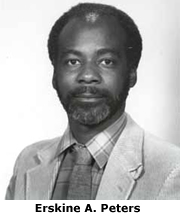
Erskine A. Peters was a distinguished and beloved English professor at Notre Dame with a legendary commitment to scholarship, community service and graduate education. And he was passionate about urging African-Americans to “rewrite their blueprint,” or code of behavior, for success in the 21st century.
Three young scholars are refining their academic blueprints this year as recipients of the Erskine A. Peters Dissertation Year Fellowship for outstanding African-American doctoral candidates in the arts, humanities and social sciences. Peters died in 1998, and in memory and honor of his passion for empowering black Americans, Notre Dame established the fellowship a year after his death.
“God and goal lines dominated my perception of Notre Dame before coming here as an Erskine Peters Fellow in the fall of 2005,” says Quincy Mills, one of last year’s fellows and now an assistant professor of history at Vassar College. “Being on campus as a Peters Fellow introduced me to the academic life at Notre Dame — one that is as intellectually vibrant and collegial as the University of Chicago, my home institution.”
Mills points out that the Peters Fellowship is one of the few national dissertation fellowships that assembles in a cohort of fellows — three this year. They will gain support from the faculty in their specific field, but they also will have one another to rely on.
“It helps to go through the job market process with colleagues who are also in the final stages of their dissertation,” Mills attests.
Melissa Stuckey, a doctoral candidate at Yale University, brings an impressive academic pedigree that includes a degree from Princeton and a past John Hope Franklin fellowship from the American Philosophical Society.
She is using the year to complete her dissertation “All Men Up: The Challenge of Black Progressivism on the Oklahoma Frontier, 1889-1939,” which argues that Oklahoma’s all-black towns were critical to the political development of the state’s black emigrants.
“Through the Peters program, I have the opportunity to focus completely on these tasks with mentorship and practical advice and support,” she said.
Stuckey and Peters fellows Katrina Thompson and Nazera Wright receive a stipend, a research budget and a faculty mentor. Professional development and employment strategies are folded into the year’s agenda, as is participation in a public forum discussing issues related to African-American life and the African diaspora.
Faculty work with the fellows to develop skills and materials that will make them successful on the job market, one of the distinguishing aspects of the fellowship, explains Richard Pierce, chair of the Department of Africana Studies, which administers the program in conjunction with the Provost’s Office.
“Another goal,” Pierce said, “is to provide the departments of the College of Arts and Letters with opportunities to interact with the fellows, and potentially hire them as tenure track faculty, as we did with Professor Jessica Wormley Murdoch in the Program of Liberal Studies. The University searches for exemplary faculty and the Erskine Peters Fellowship attracts excellent candidates at an early stage of their careers, and introduces them to the opportunities available to them at a Catholic research university.”
Thompson, a doctoral candidate at State University of New York at Stony Brook, was impressed with the Peters Fellowship Program not only because of Notre Dame’s academic reputation, but also because of a relationship one of her mentors had with Erskine Peters.
“One of my mentors at Stony Brook had the wonderful opportunity of personally knowing Peters and spoke highly of his dedication to education and African-American achievement,” she said. “The legacy of Erskine Peters and the outstanding status of Notre Dame assured me that this program could only benefit me in achieving my career goals.”
Another goal of the fellowship program is to expose emerging African-American scholars to the special qualities of a Catholic university. Certainly, the Notre Dame spirit has stayed with Mills, who says, “I owe a great deal to the Africana studies faculty and the Peters program for preparing me. I’m sure Touchdown Jesus played a guiding role as well.”
Originally published by at newsinfo.nd.edu on September 05, 2006.